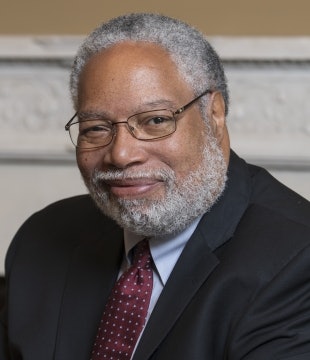On Thursday evening, the president of the philanthropic Andrew W. Mellon Foundation Dr. Elizabeth Alexander and Secretary of the Smithsonian Institution Dr. Lonnie G. Bunch III came together to discuss the increasingly vital role public institutions play in teaching American citizens their country’s history, particularly the history of Black people.
 Dr. Elizabeth Alexander, president of the Andrew W. Mellon Foundation.
Dr. Elizabeth Alexander, president of the Andrew W. Mellon Foundation.
Alexander praised Dr. Marvin Dunn, professor emeritus of psychology at Florida International University, who has pledged to continue teaching his syllabus as originally constructed before the 2022 passage of the Stop the Wrongs to Our Kids and Employees (WOKE) Act.
“The whole ‘WOKE’ bill says if you teach African American history to people, it will make them feel guilty and, therefore, you can’t teach it,” said Alexander. “Dunn is teaching on his own about lynching in Florida—there were more lynchings in Florida than Alabama. It’s a history that must be told and folks are doing it—but Dunn does it at a risk to himself and the people he teaches.”
Bunch agreed with Alexander’s concerns, calling Florida the “bellwether,” as 42 other states currenting have pending legislation that would prevent nuanced discussion about issues of race and racism in U.S. history.
“What’s amazing to me is, right now, there are 17 million high school and middle school students in parts of the country where that history can’t be taught,” said Bunch. “There’s a shadow over this, a sense that these stories, as important as they are, are not stories all Americans need to know. I’m worried that shadow [is] really effecting university professors and teachers.”
Bunch was the first director of the National Museum of African American History and Culture, part of the 19 museums of the Smithsonian Institution, which opened in D.C. in September 2016. Scholars from that institution joined experts from colleges and universities around the country, assisting the College Board for over a decade in the design of their AP African American Studies course, now banned in Florida.
 Secretary of the Smithsonian Institution Dr. Lonnie G. Bunch III.
Secretary of the Smithsonian Institution Dr. Lonnie G. Bunch III.
Bunch called this moment a “fight for all who care about education and the notion of America as a work in progress.”
“History is always divisive, and people are brave enough to understand that complexity—let’s give them some credit,” said Bunch.
Alexander said, in spite of the legislation in Florida and other states, she remains hopeful. By bringing a social justice focus to the philanthropy of the Mellon Foundation, Alexander said she has the opportunity to support arts, culture, and the teaching of history and humanities in higher education.
“People are doing incredible things. Lifting up under-recognized and under-resourced voices means we’re hearing so many different stories that people hold—and they hold their history forever—but now it’s available to so many more people,” said Alexander. “When you see people’s imaginations catalyzed and ready to go, that’s a hopeful thing all day long.”
Liann Herder can be reached at [email protected].






















